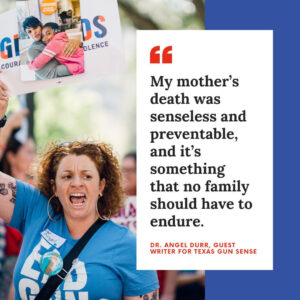PTSD and Me
By guest writer Dr. Angel Durr
My heart aches with an indescribable pain that never fades. My 54-year-old mother was taken from me and my family in April 2021 by a senseless and preventable act of gun violence. She was a kind, caring mother and grandmother. Losing her has left me reeling and struggling to cope. But I refuse to let her death be in vain. I will fight for stricter Texas gun legislation to prevent other families from experiencing the same heartbreak that I am going through.

I am far from alone in this trauma, as nearly every American will know at least one victim of gun violence in their lifetime. And it is even more disheartening to know that women in Texas are 24% more likely to be murdered with a gun than women in other states.
The aftermath of gun violence extends beyond the physical and emotional scars of the survivors, and the communities in which the victims lived. The financial costs of gun violence can be significant, and the ripple effects on families and communities can be devastating. As a victim of indirect violence, I suffer from PTSD., When I saw my mother lying there with a bullet wound to her face, I was absolutely devastated. The memories of that fateful day haunt me, making it hard to focus on anything else. The void her senseless death has left behind can never be filled.
One of the least discussed aspects of gun violence is the direct and indirect impact on survivors. Gun violence is a leading cause of death and injury in the United States, especially for children, women, and teens in particular. The survivors of gun violence often face a number of challenges in the aftermath of an incident. Many experience physical injuries that can require long-term medical care, and they may also suffer from psychological trauma.
The financial costs of gun violence can be significant, with survivors often incurring medical bills and lost wages. According to statistics, “Gun deaths and injuries cost Texas $51.3 billion each year, of which $1.1 billion is paid by taxpayers.”
Additionally, what is even more frightening is knowing that Texas leads the nation in the number of guns that are lost or stolen each year from licensed dealers.
As a survivor, I have PTSD that didn’t occur from me fighting in a war overseas. It occurred because of a situation that took place right here on American soil. It has left me feeling isolated, alone, and terrified. I often relive the events in my mind, and that can make it hard for me to focus on anything else. I may avoid people or places that remind me of what happened, and I may startle easily or become overly aggressive. The event from that day will affect me for many years to come.
I am just one of the millions of indirect victims of violent crime across the state of Texas.
It can be difficult to cope with the aftermath of a violent crime, and the experience can leave lasting emotional scars. If you or someone you know has been a victim of violent crime, it is important to seek out support and resources to help you heal and move on.
The void my mother’s death has left behind can never be filled. As a victim of crime in Texas, I have found that there is very little support offered beyond the minimal amount of therapy provided by the Texas Crime Victims Fund. This lack of support can be incredibly difficult to deal with, especially in the aftermath of a traumatic event.
The thought that the person who is responsible for my mother’s death is still free fills me with a sense of rage and helplessness. My mother’s death was senseless and preventable, and it’s something that no family should have to endure.
There are currently more than 24,000 unsolved homicides on the books in the state of Texas. That means there are hundreds of thousands of Texans out there suffering just like I am. I ask you to think about us when you consider the impact of not having harsher restrictions around access to guns.
Gun violence is a preventable epidemic that must be addressed, and I will continue to fight until my mother’s death is no longer in vain. In the words of the music legend Stevie Wonder, “Gun violence is real, people don’t come back.”